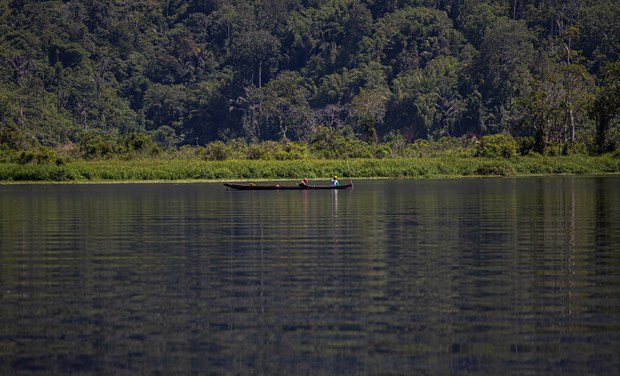Popular Reads
Top Results
Can't find what you're looking for?
View all search resultsPopular Reads
Top Results
Can't find what you're looking for?
View all search resultsHow customary laws help an Indonesian tribe preserve a forest
The Lindu tribe of about 5,000 people lives in the heart of Lore Lindu National Park, a UNESCO biosphere reserve in Indonesia’s Central Sulawesi province that is a model of how humans and nature can co-exist in harmony.
Change text size
Gift Premium Articles
to Anyone
Every morning, Abter Tendesabu puts on his boots, grabs his machete and heads to his farm in the forest.
As he nears the edge of the woods, he hears the cicadas – their loud buzzing, chirping, squawking sounds.
“They alert me that I have entered the forest,” Abter, of the Lindu tribe, tells BenarNews, as he walks through the dense greenery. “They also warn me if there is danger.”
The Lindu tribe of about 5,000 people lives in the heart of Lore Lindu National Park, a UNESCO biosphere reserve in Indonesia’s Central Sulawesi province that is a model of how humans and nature can co-exist in harmony.
In a country that faces a deforestation crisis and attendant habitat loss, the sprawling park, therefore, stands apart. It is home to some of the world’s most diverse and endangered wildlife, including hornbills, tarsier and babirusas.
The 217,991-hectare park is a beneficiary of the Lindu community’s distinctive approach to forest conservation, which stems from customary law that’s been passed down from their ancestors, said Manya Rambangudu, another Lindu villager.
“The way we apply it in Lindu I think is very special because it can prevent conflicts between residents and the government regarding forest management,” he said.
What further helps is that the state has a buy-in, and helps impose these customary laws, or rules, Abter said. Administration officials work with a customary council of elders and village representatives, called Totua Ngata, to ensure that rules are respected and enforced.
Customary laws are also taught to children in elementary schools, so they can learn the values of their ancestors from an early age.
The customary rules divide the forest into four zones, each with different levels of access and management, said Nurdin Yabu Lamojudu, chairman of the Lindu Tribal Council.
The first zone, Wanangkiki, is off-limits to all – it is the home of the spirits and the ancestors.
The second zone, Suakantodea, is where the Lindu people can collect some plants and wood, such as rattan, bamboo, and herbs, for their daily use.
In the third zone, Pangale, they practice shifting cultivation, growing rice, corn, cassava, and other crops using traditional methods.
Main crops, such as cocoa, coffee, fruits, and vegetables, which they sell in the market, are grown in the fourth zone, Pobondea, Popampa, and Polida.
The park’s lake is also divided into three zones. Fishing is banned in the core zone, the deepest part of the lake.
In the buffer zone, which is the middle part of the lake, fishing is allowed only using traditional equipment and methods.
In the lake’s shallow part, or the utilization zone, fishing is allowed with any equipment and methods.
Sanctions, known as givu, are imposed on those who disobey these customary rules. The penalties include a buffalo or cash or even expulsion from the Lindu community.
The park officials and the tribal council work together to patrol and monitor the forest, and to punish anyone who violates the rules, Abter said.
And yet, according to UNESCO, the park has suffered from “massive” illegal logging, hunting and poaching in recent times. Unauthorized gold mining also contributed to the damage, according to park director Titik Wurdiningsih.
According to a 2022 land cover analysis, all these illegal activities have affected nearly 12 percent or about 60,000 acres of the park.
“The destruction has harmed the habitat of wildlife and reduced the function of the park as a catchment area for water resources,” Titik said.
“The mining activities use harmful chemicals, such as cyanide and mercury, which pose health risks for the people around the mining sites.”
Abter said other threats to the forest include “theft of various forest yields, including rattan and wood, as well as poaching of endemic animals that are protected.”
Despite the challenges, the Lindu people are determined to preserve their way of life.
“We are grateful that customary law is still obeyed,” Abter said.
Mohamad Irwan, the regent of Sigi, said that the Lindu’s forest management practices were an extraordinary gift. The forests in Sigi and Poso regencies are part of Lore Lindu National Park.
“Lindu is very rich in tradition. That’s why the forest there can be preserved well because there are customary rules that are highly respected. And the people are afraid to violate them,” Irwan said.
He said 75 percent of Sigi’s territory was forested and most of it was conservation and protected forest managed by the National Park Authority.
“In general, the people in Sigi know how to manage the forest. They know which rules to follow and which not to,” Irwan said.
Often, when the state and indigenous peoples have different interests and views on how to manage a forest, the two sides may have a conflict, said Syaiful Taslim, a researcher at Karsa Institute, a forest conservation organization in Central Sulawesi.
But in Poso and Sigi, there is a harmonious relationship between the government and the local communities.
The Lindu people have a deep-rooted philosophy about the forest, which they express as “Ginoku katuhuaku,” which means, “This place is my life,” said Nurdin, the Lindu tribal council’s chair.
“If you want to live, don’t destroy the place where you live,” he said.











